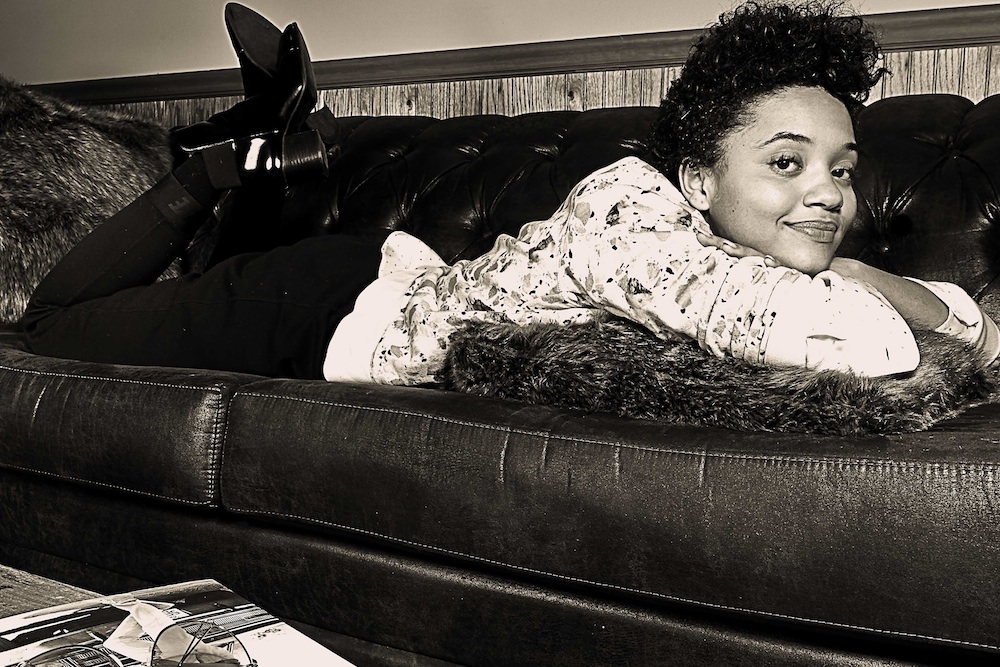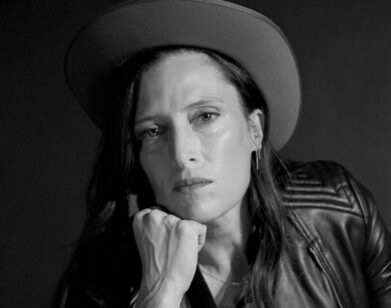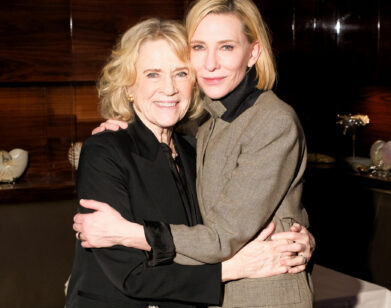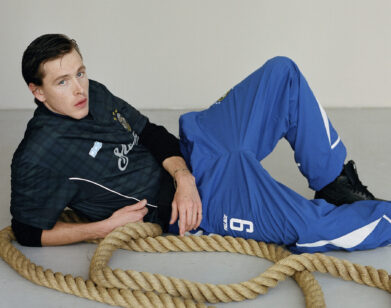From Disney to Dope

ABOVE: KIERSEY CLEMONS AT THE SUNDANCE FILM FESTIVAL IN PARK CITY, UTAH. PHOTO BY KATIE FISCHER.
At Sundance last week, you heard people recommending Dope to fellow festival-goers so often that it became conspicuous—in corporate gifting suites, on the street, at dark and noisy parties, and in line for other films. Its knockout cast (which includes Forrest Whitaker’s voice, A$AP Rocky, Chanel Iman, Zoë Kravitz, Workaholics’ Blake Anderson, and The Grand Budapest Hotel‘s Tony Revolori) and its Pharrell-produced soundtrack were certainly selling points. But so were its subject matter (life in the mostly black, working-class L.A. suburb of Inglewood), its fast-paced plot (a self-identified “geek” named Malcolm gets caught up in a complicated drug trade), and its earnest but un-self-serious tone. It’s all cut together in an energetic and engaging way; on Saturday, the film won the U.S. Dramatic Special Jury Award for Excellence in Editing.
In a busy picture crowded with interesting names, Kiersey Clemons plays one of Malcolm’s two best friends, Diggy, with quiet and cool. “I had an idea in my head of who Diggy was,” explained Rick Famuyiwa, who wrote, directed, and produced the film. “When Kiersey came in, she completely scrambled that. She gave me an amazing idea of this girl, who she is, and what it is to be gay for a kid today, which is just being a kid”—he paused, then clarified—”in many ways.”
Clemons, who just turned 21, got her start on Disney shows with very Disney-sounding names like Shake it Up! and Bucket and Skinner’s Epic Adventures. Since finishing her own TV movie for the network, Cloud 9, in the last year, she’s started to pick up significantly more mature roles: one in Amazon’s critical darling Transparent, one in MTV’s new murder-mystery series Eye Candy, and, of course, her film debut in Dope. We met up with her in Park City the day after the movie’s premiere. She’d been to Sundance once before with Disney, but, she said, smiling at the obvious, “this is totally different.”
ZACK ETHEART: Had you seen the final cut before yesterday?
KIERSEY CLEMONS: No, none of us did.
ETHEART: And what was that like?
CLEMONS: [laughs] We were all so nervous and freaked out. But after seeing the trailer, and getting to see some stuff in ADR, we always trusted Rick. After we saw a few little clips, we were like, “Oh, this is going to be good, I think.” And after seeing the trailer, we knew it was definitely going to be good.
ETHEART: How’d you get the part?
CLEMONS: It’s so funny, because my roommate was doing an audition for it, and he said Pharrell was doing the music. And I was like, “That is so cool! I need to audition.” He was like, “Oh, there’s a role in it that I think you could read for,” and he was talking about Zoë’s part, Nakia. I was just like, “Okay, well, I’m not going to mess with fate. My agent’s good; I trust her. If I’m supposed to be in the room, I’ll be in the room.” I love Pharrell. I’ve always wanted to work with Pharrell. And at this point, that’s all I’d heard. I didn’t know Forrest Whitaker or Rick were involved. That was all I knew: movie and Pharrell. And I was like,Wow, I want to do that. So then my friend’s boyfriend auditioned for it, and I was like, “Seriously, everyone’s auditioning for this movie but me.”
Then, a couple days later, I get the audition, and I’m thinking it’s going to be for Nakia, and it was for Diggy. I was just like, “Oh, shit. Fuck yeah! This is way better.” The audition was literally across the street from my house, I walked there in two minutes. I went to the audition and I read with Shameik [Moore] and Blake and Tony. When we all read together, I just knew: This is vibing out, this is working. Our agents told us that we had another callback, so we all went in thinking, “Phew, okay, this is the last step,” and then we go in and Rick was like, “Okay, you guys are Dope.”
ETHEART: You don’t seem to play a type; all of your characters are really substantially different from each other. Is there any kind of character you gravitate towards?
CLEMONS: I don’t know, I feel like any role that I play is a little piece of me, whether it’s their perspective, maybe how they dress, what they think is funny, their loyalty to their friends. It all stems from Kiersey. But I really want to play something like Girl, Interrupted. Something just super disturbing and raw, because I haven’t done that yet. I really enjoyed playing Diggy and really having to get rid of all my gestures, because Diggy’s not very expressive. She’s a lot more slouchy—like, the homie. I’m slouching right now, I guess. [laughs] But she would be even lower. She hangs out with guys, so her gestures, and how she speaks, her slang, is more like her guy friends’, whereas I grew up in a household of girls, so I would just pick up naturally what everyone else was doing. I want to do something more like Diggy where I really have to change my mindset and lose myself in it. But still, even with Diggy, things like her sarcasm come from me. So there’s still a piece of me in everything.
ETHEART: What was it like to work with Pharrell on this?
CLEMONS: Pharrell wrote and produced all the music. We heard the demos of him singing it, but they weren’t really done in any way because he wanted to meet us before he finished to get inspiration and know the characters and our take on them, and he wanted to speak to Rick. So when we got in the studio was really when things happened. We got to see him add more to the beat, which was so, so cool—to see him make a track. We would be talking about our characters and talking about our scenes and he would get inspiration and come back with a verse. He was really hands-on; he really wanted to work with us. He would literally come get in the booth with me and show me—he’s very particular. [laughs] He would want something very specific and would sing it until I got it. So I would be there like, “Oooh! Ooh!” And he would be like, “No—Ooooh, oooh!” It was so fun.
ETHEART: How long have you lived in L.A.?
CLEMONS: Well I lived just outside of L.A. for a long time. My dad was in the military, so I moved a lot. But I live in Studio City now, and I’ve lived there for a year.
ETHEART: Did the movie feel close to home at all?
CLEMONS: It definitely did. I went to high school in Redondo Beach, so a lot of people that went to my school are from Inglewood or Gardena. My best friend lives in Gardena. I know plenty of people like Diggy and Jib and Malcolm, definitely. So it was nice to read something and know, this is so honest, Rick knows what he’s talking about, and these are actual conversations that I hear going on. Okay, maybe not the conversations about how to sell drugs for bitcoins. [laughs] But the other stuff. Those Coachella references and everything like that—it was very real. I think people are going to watch it who are in those positions and live in those areas, and they’re going to feel honored. Like, “Hell yeah. Represent. Thank you.”
ETHEART: Are you expecting any controversy around it?
CLEMONS: I mean, obviously we’re talking about gang violence, drugs, homosexuality, feminism. Clearly, there are political talking points in it. But that’s life. You can talk about anything, and a counter-argument for it, any day of the week, all the time. You can do that with anything, but why? Just accept that it is what it is. There are lesbians everywhere. There are white kids running around calling their black friends “nigga,” and don’t mean any type of offense in it. There’s kids trying to get out of the hood everywhere. That’s life. And that’s what Rick is showing. He’s basically saying to stop feeling uncomfortable, trying to act like it’s not happening. People are dying. They’re getting shot over Gameboys. Kids are being dragged into having to sell drugs. And that’s life. And I think that’s the best part—obviously there are going to be people who will have their opinions about it, and other people are going to have their counter-arguments. But Rick doesn’t care. We’re all expecting it and we’re happy to talk about it. It’s obviously made with good intent, and that’s very clear throughout the film. Rick’s just telling a story.
ETHEART: That makes me think of Transparent—it being political, but its focus being on this very personal narrative.
CLEMONS: Exactly. Yeah, exactly. You’re so right, there’s definitely a relationship between those two things. I didn’t even think about that. ‘Cause Transparent, I really don’t see people saying anything negative about it. And I think, more importantly, we want to affect the people who are going through what we’re talking about. That’s the most important part. We want to give hope to the kids that are in the hood the same way that Jeffrey Tambor is giving hope to the kids in high school that are going through a transition. So I’m flattered that I’m a part of that.
DOPE WAS ACQUIRED BY SONY PICTURES AT THE SUNDANCE FILM FESTIVAL IN PARK CITY, UTAH. IT WILL BE RELEASED JUNE 12, 2015.
For more from the Sundance Film Festival 2015, click here.






